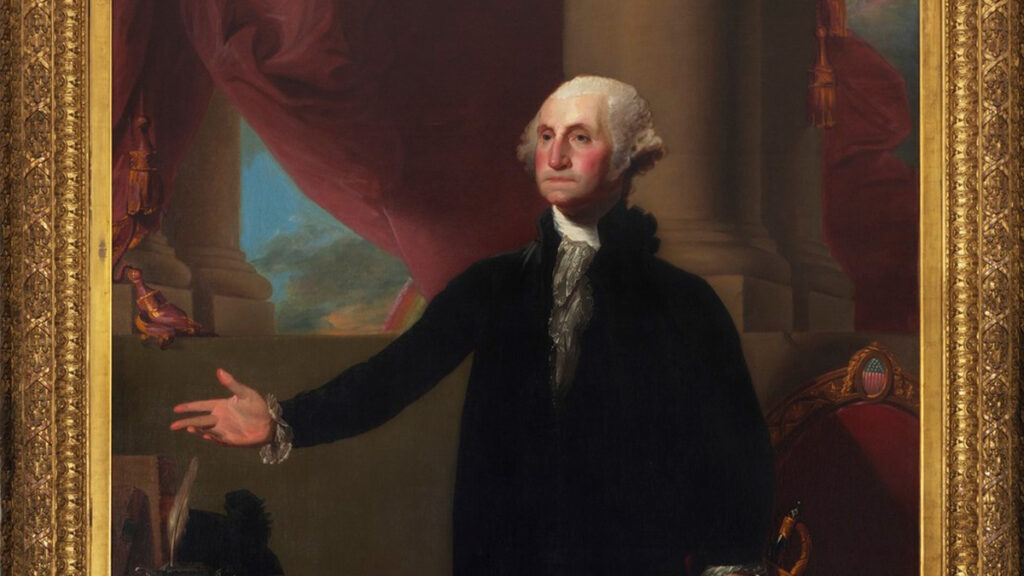Last updated on February 22nd, 2023 at 08:50 am
On President’s Day 2023, as America celebrated the birth of its incomparable first president (“the indispensable man,” as biographer James Thomas Flexner called him), a firm that specializes in finding important historical documents made this surprising announcement:
The Raab Collection announces today [February 20] the discovery of a letter of George Washington, which sheds unique light on the financial plight of the nation’s founding father on the cusp of the great Constitutional Convention in 1787. The letter, valued at $50,000, shows his need to sell land to raise cash. This unpublished letter has heretofore been unknown to scholars. For generations, it has been in a small private collection in coal country in rural West Virginia, an inheritance from a now-deceased collector. This powerful letter, coming as it does on the doorstep of one of Washington’s great moments, gives us a glimpse into the financial stresses and concerns of Washington.
The long-forgotten letter underscores the sacrifices Washington made in his shared commitment with the signers of the Declaration of Independence—he was already in the field commanding troops when the document was produced—to pledge their lives, their fortunes, and their sacred honor.
Why put everything on the line and stand up to the mightiest military power on earth in a war that at best would be, as John Adams predicted, “long, obstinate, and bloody”? Because, answers the Declaration, everything was at stake: the Creator-endowed rights of Americans—and all mankind—to life, liberty, and the pursuit of happiness. It was no mere rhetoric; at the close of the War, Washington would comment, “The establishment of civil and religious liberty was the motive which induced me to the field.”
Years later while concluding his service as the nation’s first president, he wrote a letter to America, a letter now largely forgotten but alongside which the newly discovered letter pales in significance. It is Washington’s Farewell Address, his final testament to the fledgling nation for which he had sacrificed so much. In his advice to his fellow Americans both present and future, the word “indispensable” leaps out.
Of all the dispositions and habits which lead to political prosperity, religion and morality are indispensable supports. In vain would that man claim the tribute of patriotism, who should labor to subvert these great pillars of human happiness, these firmest props of the duties of men and citizens. The mere politician, equally with the pious man, ought to respect and to cherish them.
This was a crystallization of what President Washington had stated eight years earlier in his First Inaugural Speech:
The foundations of our National policy will be laid in the pure and immutable principles of private morality…. There is no truth more thoroughly established, than that there exists in the economy and course of nature, an indissoluble union between virtue and happiness, between duty and advantage, between the genuine maxims of an honest and magnanimous policy, and the solid rewards of public prosperity and felicity…. We ought to be no less persuaded that the propitious smiles of Heaven can never be expected on a nation that disregards the eternal rules of order and right, which Heaven itself has ordained.
However much Washington’s letter from the Raab collection brings at auction, his letter to America is priceless. The man who was eulogized as “First in war, first in peace, and first in the hearts of his countrymen” bequeathed to his country not only liberty but the formula for keeping it—a veritable life preserver for the crisis of our day when Americans who hate America are, according to Mark Levin, “using America’s freedom to destroy freedom and the Constitution to destroy the Constitution.”
The counterrevolution to the American Revolution is in full force. And it can no longer be dismissed or ignored, for it is devouring our society and culture, swirling around our everyday lives, and ubiquitous in our politics, schools, media, and entertainment. Once a mostly unrelatable, fringe, and subterranean movement, it is here—it is everywhere. You, your children, and your grandchildren are now immersed in it, and it threatens to destroy the greatest nation ever established, along with your freedom, family, and security.
The solution? According to Matthew Spalding,
We don’t need to remake America, or discover new and untested principles. The change we need is not the rejection of America’s principles but a great renewal of these permanent truths about man, politics, and liberty—the foundational principles and constitutional wisdom that are the true roots of our country’s greatness.
To rescue the greatest nation on earth from itself, we must dust off Washington’s long-forgotten letter to America and proclaim its truths from the housetops. America must remember its roots and return to its indispensable supports of religion and morality, “these great pillars of human happiness, these firmest props of the duties of men and citizens.”
